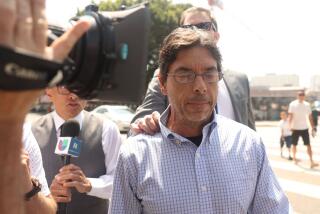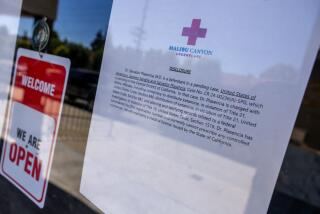Jackson doctor tried to hide meds before calling 911, aide testifies
- Share via
A lawyer for Michael Jackson’s physician attacked the testimony of an important prosecution witness Thursday, suggesting his damning account of the doctor’s actions was physically impossible and influenced by offers of huge sums from tabloids.
The witness, security guard Alberto Alvarez, is key to the prosecution’s theory that Dr. Conrad Murray delayed calling for an ambulance for Jackson in order to hide evidence that the doctor had given the singer the dangerous surgical anesthetic propofol and other drugs.
But cross-examining Alvarez on the third day of Murray’s involuntary manslaughter trial, a defense lawyer said phone records cast doubt on the witness’ chronology. Those records established a window of approximately 30 seconds long for what the attorney identified as 14 separate events in Jackson’s bedroom ranging from Alvarez’s comforting of the singer’s children to his placing pill bottles in bags.
“Do you think you could have performed all these events that are listed here in half a minute?” lawyer Ed Chernoff asked.
“I’m very efficient, sir,” replied Alvarez, a burly man with a brush haircut and stony demeanor.
A prosecutor shot back by asking Alvarez whether many of the events enumerated by Chernoff had occurred simultaneously.
“This was all one fast-paced series of events?” he asked.
“Yes, sir,” Alvarez responded.
According to testimony, Alvarez ended a call with Jackson’s personal assistant before he entered the singer’s bedroom. The heart of Alvarez’s testimony, which he gave first at a January hearing and reiterated on the witness stand Thursday, is his claim that before Murray asked him to dial 911, the doctor ordered him to gather up drug bottles, vials and an IV bag of a “milky, white substance.” Propofol is white.
“I thought we were packing up for getting ready to go to the hospital,” he testified, adding that at the time, he believed the doctor had “the best intentions.”
Investigators later discovered bags containing 11 bottles of propofol stashed in a cabinet in another bedroom of Jackson’s rented mansion.
Under cross-examination, Murray’s lawyer implied that it made no sense for Murray to enlist Alvarez, whom he did not know well, in a cover-up.
“Can you think of any reason why Dr. Murray would think you would conspire with him to hide evidence,” he asked. A prosecutor objected, and Judge Michael Pastor told him not to answer.
Alvarez acknowledged that when he talked briefly to police the day Jackson died, he told them that he had called 911. Two months later, he met with detectives at the office of a lawyer representing him and other security guards and gave a lengthy statement that included the allegations that he had put medical evidence in bags at Murray’s request.
Alvarez had previously recounted fielding as many as 30 offers from media outlets to sell his story and said he had rejected them all, including a $500,000 deal, despite desperately needing money.
Chernoff pressed him about his dealings with tabloids in the period between his initial talk with police and his later interview. Alvarez said numerous outlets made overtures, including a London tabloid. That deal, he said, progressed far enough that a contract was drawn up.
“Would it be fair to say the story you gave on Aug. 31 was substantially more interesting than the one you gave” the day of Jackson’s death, Chernoff asked.
The judge ordered Alvarez not to answer.
During Alvarez’s testimony, prosecutors played jurors a recording of the 911 call the security guard placed. In it, he told an operator that he needed “an ambulance as soon as possible” for a 50-year-old man who had stopped breathing.
“We have a personal doctor here with him,” Alvarez said, prompting the operator to ask if the doctor had seen what happened. The security guard relayed the question to Murray, who responded by yelling for paramedics to hurry.
“He’s not responding to anything, sir,” Alvarez added.
Murray looked stricken at the defense table as the security guard recounted the chaotic moments before he placed the call. Alvarez, who carried the title of head of logistics, said Murray was making a haphazard attempt at CPR. Jackson was on a soft surface — his mattress — and Murray was using just one hand, he said.
At one point, Alvarez said, the cardiologist asked, “Does anybody know CPR?”
He choked up as he recalled how Jackson’s two older children had witnessed the attempts to revive their father.
“Paris screamed out, ‘Daddy,’” Alvarez said, his eyes wet. He said he ushered her and her brother Prince out of the room with assurances that “everything will be OK.”
Murray, 58, contends Jackson administered the fatal dose of propofol. He faces a maximum of four years in prison if convicted.
More to Read
Sign up for Essential California
The most important California stories and recommendations in your inbox every morning.
You may occasionally receive promotional content from the Los Angeles Times.












